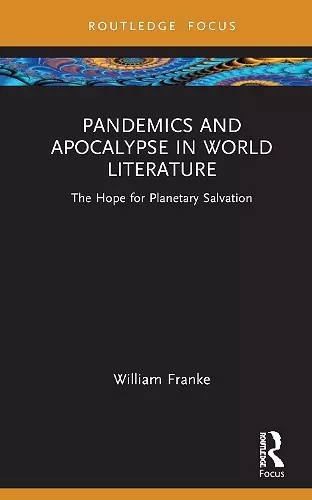Pandemics and Apocalypse in World Literature
The Hope for Planetary Salvation
Format:Hardback
Publisher:Taylor & Francis Ltd
Published:19th Feb '25
Should be back in stock very soon

Pandemics and Apocalypse rereads classical narratives of plague from the Bible (Exodus) and classical antiquity, both Greek (Homer, Thucydides, Sophocles) and Roman (Lucretius, Virgil, Ovid), through the Middle Ages (Dante, Boccaccio) and Modernity (Defoe, Manzoni, Artaud, Camus) as a basis for contemplating the significance of the recent Covid-19 pandemic. It concerns how we are to confront future pandemics and other inextricably related crises, notably those of an ecological nature. Responses to Covid-19 typically set everything on defeating this “enemy,” but actually we cannot eliminate viruses without eliminating ourselves. We need to see the pandemic as revealing us to ourselves in our inherently vulnerable condition as a first step to admitting the infinite openness to one another and to our Ground—physical and metaphysical—that alone can save our world by engendering a different attitude, open and engaged, to one another and to the Earth as sources of our collective life.
William Franke delves into how disease and death force humanity to confront its deepest vulnerabilities in this profound exploration of pandemics in literature. Much like apocalyptic events, pandemics raise fundamental questions about the viability of human society, the fragility of life, and the structures that bind us together. These crises level all distinctions, revealing the often-ignored truths about inequality, mortality, and our shared existence. Yet amidst the despair, the text argues for hope—not as a solution to our vulnerability, but as an openness to life in all its uncertainty. This hope inspires us to transcend self-preservation, fostering solidarity and collective action toward a more meaningful life. The book illuminates the inexpressible dimensions of these world-shattering experiences through personal witness and reflection, offering a powerful meditation on the human condition.
-Prof. Massimo Lollini, Professor Emeritus of Italian, University of Oregon, USA
Pandemics and Apocalypse in World Literature is not just a scholarly survey but a constructive approach that gives itself the task to wrest possibilities of an eschatological hope from the night of apocalyptic despair. Written in the wake of the recent pandemics, the work deploys negative theology at its most creative possibility: it consists of an infinite affirmation of the unconditioned which nevertheless remains irreducibly ineffable. Franke brings together, without reducing their disparate character, the agonal traits of the end and the beginning, of despair and hope, of the abyss of the night and the first morning glow; and he shows, through rigorous exegesis of some of the very difficult texts, that perhaps the only task that is worthy today is to see the possibility of the radical, incalculable alterity that our history never ceases exposing us to. Dense, profound, thought-provoking.
-Prof. Saitya Brata Das, Associate Professor, JNU, India
William Franke's history of pandemic literature, from the ancient world to COVID, helps us understand what we are all still wondering about: what exactly happened to the us in 2020? The pandemic made us all more aware of the contingency of order, and the religious significance of this awarness, while overlooked by many, is for Franke the big take away. An eye-opener.
-Prof. Sean J. McGrath, Professor, Memorial University, Canada
William Franke's book is exceptionally important as it masterfully combines three areas of expertise: literary, anthropological, and philosophical-theological. On one hand, it offers an erudite and nearly unprecedentedly broad reconstruction of the phenomenology of the plague from its origins to the present, covering not only Western cultures but also Jewish and Chinese perspectives. On the other hand, it presents a sociological reflection on the deep-rooted causes of the plague’s reemergence (today in the form of Covid-19) and its philosophical and existential implications. Saint Paul's saying, spes contra spem (hope against hope) is reimagined and explored within the context of apophatic theology. The reference to the Native American model of vital experience, along with Western and Eastern mysticism, underscores the depth of this approach.
-Walter Minella, Philosopher in Neurotheoretical Research Group, Pavia, Italy
William Franke meditates on the currently constitutive crisis of human materiality, as it manifests in the collective imbalance symptomatized by an epidemic and crashes in on every shoreline of our ecological future. In his distinctive reading of the unspeakability of our circumstance through apophasis, and the intensity of the crisis through apokalypsis, fresh insight breaks through for more spirited collective response.
-Prof. Catherine Keller, G.T. Cobb Professor of Constructive Theology, Drew Theological School, USA
ISBN: 9781032895857
Dimensions: unknown
Weight: 450g
146 pages